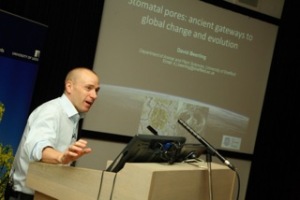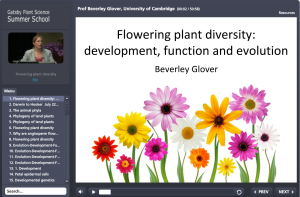 In our recently published study (Levesley et al 2014, New Phytologist, June 2014, http://dx.doi.org/10.1111/nph.12905) we show that online research lectures, when embedded into a course as part of a blended learning approach to teaching, are an effective learning tool and have the potential of changing student attitudes to plant science, engaging students in research and are able to reach a large and wide student audience. These research lectures and many other educational resources, contributed by the plant science community are available for free via the Plant Science TREE (Tool for Research Engaged Education, http://www.tree.leeds.ac.uk). Could bringing the excitement of cutting edge plant science research examples to undergraduates, help to engage more students in plant science?
In our recently published study (Levesley et al 2014, New Phytologist, June 2014, http://dx.doi.org/10.1111/nph.12905) we show that online research lectures, when embedded into a course as part of a blended learning approach to teaching, are an effective learning tool and have the potential of changing student attitudes to plant science, engaging students in research and are able to reach a large and wide student audience. These research lectures and many other educational resources, contributed by the plant science community are available for free via the Plant Science TREE (Tool for Research Engaged Education, http://www.tree.leeds.ac.uk). Could bringing the excitement of cutting edge plant science research examples to undergraduates, help to engage more students in plant science?
The need to inspire a new generation pf plant scientists. The call for increased investment in plant science and related disciplines to meet the global challenges of food security, climate change, energy and conservation of biodiversity (Royal Society 2009; UK Plant Science Federation 2014) is set against a background of low student numbers choosing to study plant science at University and there is concern about the future capacity of the UK to respond to an increased demand for plant scientists (Stagg et al 2009, BBSRC 2009). In response to this concern, many have highlighted the need to inspire a future generation of plant scientists (UK Plant Science Federation 2014).
The causes for low student uptake of plant science courses are many and include low interest in plants, a term sometimes referred to as plant-blindness (Wandersee and Schussler, 2001); disengagement from plant science at school and narrowing of plant-based undergraduate curricula. It is also possible that the GM debate has had a negative effect on uptake. Plant science is currently poorly represented in school biology curricula compared with biomedical science (UK Plant Science Federation, 2014) and many students enter biological science courses at university with little interest in, or knowledge of, plants (Stagg 2009). Low undergraduate student uptake of plant courses has had a negative impact on its provision, contributing to a decline in the number of UK universities offering specialist plant science degree courses (Drea 2011, UK Plant Science Federation (2014). Less visibility at school and university together with a lack of clear career options for plant science graduates, means that students may not readily appreciate the importance or relevance of the subject.
Can anything be done? Engaging students with plant science early in their studies is arguably an important step in reversing the decline in uptake of this vulnerable yet strategically important subject. In a previous study we evidenced that exposing first year undergraduates to high quality research-led plant science teaching, through a week long summer school, funded by the Gatsby Charitable Foundation, stimulated a greater interest in plant science which led to increased uptake of plant science courses in their second and final years and increased the number of graduates selecting plant-based PhDs (Levesley et al 2012).
The Gatsby Plant Science summer school lectures were delivered by research leaders and pitched at a level to engage undergraduates, these lectures were filmed and edited for online delivery and are available through the Plant Science TREE. Many lecturers refer their students to these research talks as additional information or as a cutting edge research example to support a topic. In our study, undergraduates from four UK universities were provided with links to the online research lectures as part of their course. Interestingly, we found that students responded almost as positively to these summer school research lectures when viewed online compared to when they were viewed live, by a separate student cohort. Furthermore, 62% stated that the research talks had made them more interested in plant science and 68% said they had increased their interested in research in general. Not only were the online lectures successful in engaging a majority of students with plant science and research, but students were unanimous in the opinion that they were a good way to learn about a subject. Interestingly, our results also indicate that students want to see more online research lectures even if they are not directly related to their course work (Levesley et al 2014).
Most students do not have the opportunity to experience research talks delivered by internationally recognised scientists. Through the TREE online research lectures, students are supported to do just that and can gain a unique insight into how discoveries are made from the very people that made the discovery. Indeed our study found that students place a high value on the opportunity to watch research leaders talking about their research. For example, through the TREE, students currently have the opportunity to watch talks by Prof. Peter Beyer, co-inventor of Golden Rice; Prof. Julian Hibberd who talks about the landmark research on engineering C4 photosynthesis into rice; Prof. Jim Barber on building an artificial leaf to efficiently capture and use solar energy; Prof. Sir David Baulcombe on science and the sustainable intensification of global agriculture, to name but a few. Through these and other research talks, undergraduates can be introduced to cutting-edge plant science research that address globally relevant applied initiatives as well as curiosity-driven research.
 A screenshot of an online research lecture by Prof Beverley Glover, University of Cambridge on the ‘Flowering plant diversity: development, function and evolution’. This, and other research lectures delivered by leading plant scientists and pitched at a level to engage undergraduates, were filmed at the Gatsby Plant Science Summer Schools and may be viewed for free by registering with the Plant Science TREE at http://www.tree.leeds.ac.uk.
A screenshot of an online research lecture by Prof Beverley Glover, University of Cambridge on the ‘Flowering plant diversity: development, function and evolution’. This, and other research lectures delivered by leading plant scientists and pitched at a level to engage undergraduates, were filmed at the Gatsby Plant Science Summer Schools and may be viewed for free by registering with the Plant Science TREE at http://www.tree.leeds.ac.uk.
The TREE is designed to bridge the gap between undergraduate education and research in a way that will benefit both. Our study also found that the TREE supported the upskilling of teaching staff by making cutting edge research talks available to them.
The Plant Science TREE makes inspirational teaching resources from the plant science community available online, so that the excitement and potential for plant science can be disseminated to a wide student audience through educators worldwide. More than 90 research academics and publishers have contributed over 2000 resources, including online research lectures, research-led lecture slides, practicals, video clips and other resources on topical plant science. It was developed by the University of Leeds with funding from the Gatsby Charitable Foundation, and is currently used by scientists, educators and students from over 320 institutes worldwide. We believe its success is due to the generosity of its contributors and hope that the inspirational resources within the TREE may make a contribution to changing student attitudes to plant science, engaging students in research and may reach a large and wide global student audience.
If you would like to share with the plant science community any of your lecture slides, images or other educational resources that you have created then we would be delighted to receive these via the TREE upload facility. To contribute a resource please visit the Plant Science TREE at http://www.tree.leeds.ac.uk, login and then select ‘upload’.
The full reference for the Plant Science TREE paper is: Levesley A, Paxton S, Collins R, Baker A and Knight CD. Engaging students with plant science: the Plant Science TREE. New Phytologist, Volume 203, Issue 4, pages 1041–1048, September 2014. http://dx.doi.org/10.1111/nph.12905
Dr Aurora Levesley,
Technology Enhanced Learning Officer, University of Leeds
References
BBSRC. 2009. Strategically important and vulnerable capabilities in UK bioscience. http://www.bbsrc.ac.uk/organisation/policies/reviews/consultations/0905-bioscience-research-skills.aspx
Drea S. 2011. The end of the botany degree in the UK. Bioscience Education, vol. 17, art. no. 2. York, UK: HESA. http://journals.heacademy.ac.uk/doi/full/10.3108/beej.17.2
Levesley A, Jopson SJ, Knight CD. 2012. The Gatsby Plant Science Summer School: inspiring the next generation of plant science researchers. The Plant Cell 24: 1306–1315. http://dx.doi.org/10.1105/tpc.111.094326
Levesley A, Paxton S, Collins R, Baker A and Knight CD. 2014. Engaging students with plant science: the Plant Science TREE, New Phytologist Volume 203, Issue 4, pages 1041–1048. http://dx.doi.org/10.1111/nph.12905
The Royal Society. 2009. Reaping the benefits: science and the sustainable intensification of global agriculture. London, UK: The Royal Society. https://royalsociety.org/policy/publications/2009/reaping-benefits/
Stagg P, Wahlberg W, Laczik A, Huddleston P. 2009. The uptake of plant sciences in the UK. A research project for the Gatsby Charitable Foundation. Coventry, UK: University of Warwick, The Centre for Education and Industry http://bit.ly/1qvfANF
UK Plant Science Federation. 2014. UK plant science: current status and future challenges. https://s3-eu-west-1.amazonaws.com/sbwebsite/pdf/UK_Plant_Science-Current_status_and_future_challenges.pdf
WanderseeJ.H. and SchusslerE.E. (2001) Toward a theory of plant blindness. Plant Science Bulletin, 47, 2-9






